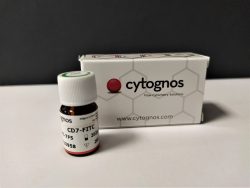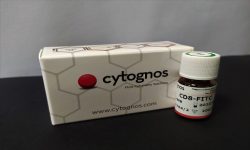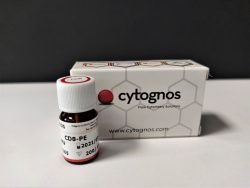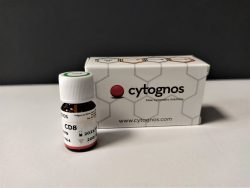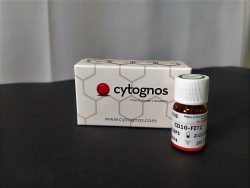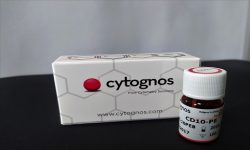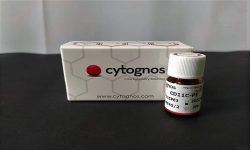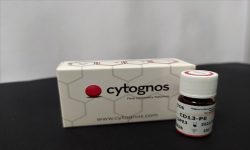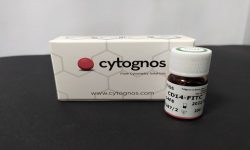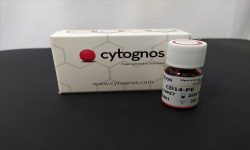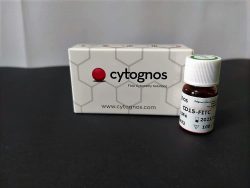Archives: فروشگاه
Showing 361–380 of 651 results
فیلتر ها-
آنتی بادیهای فلوسایتومتری
آنتی بادی مونوکلونال فلوسایتومتری CD5-PerCP-Cyanine5.5، کلون L17F12
Rated 0 out of 5Name: Flow Cytometry Antibody CD5-PerCP-Cyanine5.5, Clone L17F12
- Antibody CD5-PerCP-Cyanine5.5 is a monoclonal antibody (mAb) labelled with Peridin chlorophyll protein-Cyanine 5.5 (PerCPCyanine5.5), designed for use as a direct immunofluorescence reagent in the identification and enumeration of cells which express the CD5 antigen by Flow Cytometry (FC). CD5 is a useful marker for the identification of certain lymphoprolipherative syndromes when is used within an extended immunophenotyping panel. This reagent must be used by flow cytometry qualified personal.
SUMMARY AND EXPLANATION
The CYT-5C2 mAb recognizes a 67 kDa antigen expressed by a majority of thymocytes and mature T cells and a subset of B cells. CD5 is expressed at low density on thymocytes and at high density on all mature T lymphocytes. The majority of T cell malignancies expresses CD5, and almost 85% of T cell acute lymphoblastic leukemias are CD5 positive. Further, CD5 is expressed at low density on a small subset of mature B lymphocytes, which is expanded in several autoimmune disorders as well as in some B-cell derived lymphoproliferative disorders such as chronic lymphocytic leukemia (CLL) and centrocytic leukemia.
REAGENT COMPOSITION
Purified monoclonal CD5 antibody conjugated with conjugated with PerCP-Cyanine5.5, supplied in phosphate-buffered saline (PBS) containing 1% (m/v) BSA and 0.09% (m/v) sodium azide.
- Clone: L17F12
- Isotype: Mouse / IgG2a
- Purification: Affinity chromatography
- Amount per vial: 50 tests (3 ml mAb to 106 cells) Reagents are not considered sterile.
-
آنتی بادیهای فلوسایتومتری
آنتی بادی مونوکلونال فلوسایتومتری( CD7-APC(HULY-M2 ، کلون HULY-M2
Rated 0 out of 5Name: Flow Cytometry Antibody CD7-APC (HULY-M2), Clone HULY-M2
- Antibody CD7-APC is a monoclonal antibody (mAb) labelled with the Allophycocyanine (APC) designed for use as a direct immunofluorescence reagent in the identification and enumeration of cells which express the CD7 antigen by flow cytometry (FC). The CD7 mAb is considered essential for the initial evaluation of T-cell acute lymphoblastic leukaemias (T-ALL) and T-cell chronic leukaemias together with a panel of other antibodies. This reagent must be used by flow cytometry qualified personal.
SUMMARY AND EXPLANATION
CD7 is a 40KDa glycoprotein expressed on thymocytes, mature T cells, natural killer cells, pluripotent hematopoietic stem cells, and progenitors of lymphoid and myeloid cells. CD7 is one of the earliest T-cell-specific antigens to be expressed in lymphocytes, and the only early marker to persist throughout differentiation. Analysis of the expression of the CD7 antigen as a T cell line marker, in combination with those CD3 and CD5 antigens, is useful in the diagnosis of T cell proliferative syndromes such as T-ALL and T-prolymphocyte T cell leukaemias. The absence of expression of CD7, or its abnormal expression, can provide useful information in the case of Sezary’s syndrome or chronic lymphoid leukaemia. The CD7 antigen can be expressed by certain acute immature myeloid leukaemias.
REAGENT COMPOSITION
Purified monoclonal CD7 Antibody Allophycocyanine (APC) conjugated, is supplied in phosphate-buffered saline (PBS) containing 1% (m/v) BSA and 0.09% (m/v) sodium azide.
- Clone: HULY-M2
- Isotype: Mouse / IgG2a
- Purification: Affinity chromatography
- Amount per 1 ml vial: 200 tests (5 ml mAb to 106 cells)
- Reagents are not considered sterile.
-
آنتی بادیهای فلوسایتومتری
آنتی بادی مونوکلونال فلوسایتومتری CD7-APC ، کلون CD7-6B7
Rated 0 out of 5Name: Flow Cytometry Antibody CD7-APC, Clone CD7-6B7
- CD7-APC is a monoclonal antibody (mAb) labelled with allophycocyanin (APC) designed for flow cytometry (FC) use as a direct immunofluorescence reagent in the identification and enumeration of CD7 antigen-expressing cells. The CD7 mAb is considered essential for the initial evaluation of T-cell acute lymphoblastic leukaemias (T-ALL) and T-cell chronic leukaemias together with a panel of other antibodies. This reagent must be used by flow cytometry qualified personal.
SUMMARY AND EXPLANATION
Human lymphocytes may be classified in three main populations according to their biological function and their cell surface antigen expression (T lymphocytes, B lymphocytes and natural killer (NK) cells). CYT-7AP3 MAb recognizes CD7 antigen, a 40KDa glycoprotein expressed on thymocytes, mature T cells, natural killer cells, pluripotent hematopoietic stem cells, and progenitors of lymphoid and myeloid cells. CD7 is one of the earliest Tcell-specific antigens to be expressed in lymphocytes, and the only early marker to persist throughout differentiation. Analysis of the expression of the CD7 antigen as a T cell line marker, in combination with those CD3 and CD5 antigens, is useful in the diagnosis of T cell proliferative syndromes such as T-ALL and T prolymphocyte T cell leukaemias. The absence of expression of CD7, or its abnormal expression, can provide useful information in the case of Sezary’s syndrome or chronic lymphoid leukaemia. The CD7 antigen can be expressed by certain acute immature myeloid leukaemias.
REAGENT COMPOSITION
The purified monoclonal CD7 antibody conjugated with allophycocyanin (APC) is supplied in phosphate-buffered saline (PBS) containing 0,09% sodium azide.
- Clone: CD7-6B7.
- Isotype: IgG2a.
- Amount per 1 mL vial: 100 tests (10 µL mAb per determination).
- Reagent is considered non-sterile.
-
آنتی بادیهای فلوسایتومتری
آنتی بادی مونوکلونال فلوسایتومتری CD7-FITC ، کلون B-B7
Rated 0 out of 5Name: Flow Cytometry Antibody CD7-FITC, Clone B-B7
- Antibody CD7-FITC is a monoclonal antibody (mAb) labelled with fluorescein isothiocyanate (FITC) designed for flow cytometry (FC) use as a direct immunofluorescence reagent in the identification and enumeration of CD7 antigen-expressing cells. The CD7 mAb is considered essential for the initial evaluation of T-cell acute lymphoblastic leukaemias (T-ALL) and T-cell chronic leukaemias together with a panel of other antibodies. This reagent must be used by flow cytometry qualified personal.
SUMMARY AND EXPLANATION
Human lymphocytes may be classified in three main populations according to their biological function and their cell surface antigen expression (T lymphocytes, B lymphocytes and natural killer (NK) cells. CYT-7F5 mAb recognizes CD7 antigen, a 40KDa glycoprotein expressed on thymocytes, mature T cells, natural killer cells, pluripotent hematopoietic stem cells, and progenitors of lymphoid and myeloid cells. CD7 is one of the earliest Tcell-specific antigens to be expressed in lymphocytes, and the only early marker to persist throughout differentiation. Analysis of the expression of the CD7 antigen as a T cell line marker, in combination with those CD3 and CD5 antigens, is useful in the diagnosis of T cell proliferative syndromes such as T-ALL and T prolymphocyte T cell leukaemias. The absence of expression of CD7, or its abnormal expression, can provide useful information in the case of Sezary’s syndrome or chronic lymphoid leukaemia. The CD7 antigen can be expressed by certain acute immature myeloid leukaemias.
REAGENT COMPOSITION
The purified monoclonal CD7 antibody conjugated with fluorescein isothiocyanate (FITC) is supplied in phosphate-buffered saline (PBS) containing 0,09% sodium azide.
- Clone: B-B7.
- Isotype: IgG1.
- Amount per 1 ml vial: 200 tests (5 µL mAb per determination).
- Reagent is considered non-sterile.
-
آنتی بادیهای فلوسایتومتری
آنتی بادی مونوکلونال فلوسایتومتری CD8-APC ، کلون 17D8
Rated 0 out of 5Name: Flow Cytometry Antibody CD8-APC, Clone 17D8
Ø Antibody CD8-APC is a monoclonal antibody (mAb) labelled with allophycocyanin (APC) designed for flow cytometry (FC) use as a direct immunofluorescence reagent in the identification and enumeration of CD8 antigen-expressing cells.
SUMMARY AND EXPLANATION
FC is a powerful tool in analytical and quantitative characterization of cells which provides rapid and multiparametric analysis of heterogeneous cell populations on a cell-by-cell basis. FC is performed on cell suspension after incubating it with fluorescent-labelled antibodies directed against specific cellular proteins. Positive cells relative fluorescence intensity indicates the amount of antibody bonded to specific cell sites providing information about antigen expression. Human lymphocytes may be classified in three main populations according to their biological function and their cell surface antigen expression (T lymphocytes, B lymphocytes and natural killer (NK) cells). T lymphocytes (CD3+), the precursors of which originate in the bone marrow and then migrate and mature in the thymus, can be subdivided as well in functionally different populations. The most clearly defined of these are helper/inducer T cells (CD3+CD4+) and suppressor/cytotoxic T cells (CD3+CD8+). T cells produce no antibodies and are the mediators of cell immunity. CYT-8AP mAb recognizes CD8 antigen present on suppressor/cytotoxic T cells (CD3+CD8+) and can therefore be used in lymphocytes immunophenotyping. These studies are widely applied when monitoring post-transplant patient’s immunologic status and when characterizing and following-up immunodeficiencies, autoimmune diseases, leukaemia, etc.
REAGENT COMPOSITION
The purified monoclonal CD8 antibody conjugated with allophycocyanin (APC) is supplied in phosphate-buffered saline (PBS) containing 0.1% sodium azide.
Clone: 17D8.
Isotype: IgG1.
Amount per vial: 200 tests (5 µl mAb per determination).
Reagent is considered non-sterile.
-
آنتی بادیهای فلوسایتومتری
آنتی بادی مونوکلونال فلوسایتومتری CD8-FITC ، کلون UCHT-4
Rated 0 out of 5Name: Flow Cytometry Antibody CD8-FITC, Clone UCHT-4
- Antibody CD8 reagent is a monoclonal antibody (mAb) labelled with different fluorochromes (see table) and designed for use as a direct immunofluorescence reagent in the identification and enumeration of cells which express the CD8 antigen by Flow Cytometry (FC). This reagent must be used by flow cytometry qualified personal.
SUMMARY AND EXPLANATION
Human lymphocytes may be classified in three main populations according to their biological function and their cell surface antigen expression: T lymphocytes, B lymphocytes and natural killer cells (NK). T lymphocytes (CD3+), the precursors of which originate in the bone marrow and then migrate and mature in the thymus, can be subdivided as well in functionally different populations. The most clearly defined of these are helper/inducer T cells (CD3+CD4+) and suppressor/cytotoxic T cells (CD3+CD8+). T cells produce no antibodies and are the mediators of cell immunity. The anti-CD8 mAb recognizes the CD8 antigen present in suppressor/cytotoxic T cells (CD3+CD8+) and can therefore be used in the characterization studies for immunophenotyping of lymphocytes. These studies are widely applied for monitoring of the immunologic status of post-transplant patients and in the characterization and follow-up of immunodeficiencies, autoimmune diseases, leukemia etc.
REAGENT COMPOSITION
Purified monoclonal CD8 Antibody labelled with different fluorochromes (see table above) and supplied in phosphate buffered saline with 0,09% (m/v) sodium azide.
- Clone: UCHT-4
- Isotype: Mouse / IgG2a
- Purification: Affinity chromatography
- Amount per vial: 200 tests (5 ml mAb to 106 cells)
- Reagents are not considered sterile.
-
آنتی بادیهای فلوسایتومتری
آنتی بادی مونوکلونال فلوسایتومتری CD8-PE ، کلون UCHT-4
Rated 0 out of 5Name: Flow Cytometry Antibody CD8-PE, Clone UCHT-4
- Antibody CD8 reagent is a monoclonal antibody (mAb) labelled with different fluorochromes (see table above) and designed for use as a direct immunofluorescence reagent in the identification and enumeration of cells which express the CD8 antigen by Flow Cytometry (FC). This reagent must be used by flow cytometry qualified personal.
SUMMARY AND EXPLANATION
Human lymphocytes may be classified in three main populations according to their biological function and their cell surface antigen expression: T lymphocytes, B lymphocytes and natural killer cells (NK). T lymphocytes (CD3+), the precursors of which originate in the bone marrow and then migrate and mature in the thymus, can be subdivided as well in functionally different populations. The most clearly defined of these are helper/inducer T cells (CD3+CD4+) and suppressor/cytotoxic T cells (CD3+CD8+). T cells produce no antibodies and are the mediators of cell immunity. The anti-CD8 mAb recognizes the CD8 antigen present in suppressor/cytotoxic T cells (CD3+CD8+) and can therefore be used in the characterization studies for immunophenotyping of lymphocytes. These studies are widely applied for monitoring of the immunologic status of post-transplant patients and in the characterization and follow-up of immunodeficiencies, autoimmune diseases, leukemia etc (3,4).
REAGENT COMPOSITION
Purified monoclonal CD8 Antibody labelled with different fluorochromes (see table above) and supplied in phosphate buffered saline with 0,09% (m/v) sodium azide.
- Clone: UCHT-4
- Isotype: Mouse / IgG2a
- Purification: Affinity chromatography
- Amount per vial: 200 tests (5 ml mAb to 106 cells)
- Reagents are not considered sterile.
-
آنتی بادیهای فلوسایتومتری
آنتی بادی مونوکلونال فلوسایتومتری CD8-PE-Cyanine5 ، کلون UCHT-4
Rated 0 out of 5Name: Flow Cytometry Antibody CD8-PE-Cyanine5, Clone UCHT-4
- CD8 reagent is a monoclonal antibody (mAb) labelled with different fluorochromes (see table) and designed for use as a direct immunofluorescence reagent in the identification and enumeration of cells which express the CD8 antigen by Flow Cytometry (FC). This reagent must be used by flow cytometry qualified personal.
SUMMARY AND EXPLANATION
Human lymphocytes may be classified in three main populations according to their biological function and their cell surface antigen expression: T lymphocytes, B lymphocytes and natural killer cells (NK). T lymphocytes (CD3+), the precursors of which originate in the bone marrow and then migrate and mature in the thymus, can be subdivided as well in functionally different populations. The most clearly defined of these are helper/inducer T cells (CD3+CD4+) and suppressor/cytotoxic T cells (CD3+CD8+). T cells produce no antibodies and are the mediators of cell immunity. The anti-CD8 mAb recognizes the CD8 antigen present in suppressor/cytotoxic T cells (CD3+CD8+) and can therefore be used in the characterization studies for immunophenotyping of lymphocytes. These studies are widely applied for monitoring of the immunologic status of post-transplant patients and in the characterization and follow-up of immunodeficiencies, autoimmune diseases, leukemia etc.
REAGENT COMPOSITION
Purified monoclonal CD8 Antibody labelled with different fluorochromes (see table above) and supplied in phosphate buffered saline with 0,09% (m/v) sodium azide.
- Clone: UCHT-4
- Isotype: Mouse / IgG2a
- Purification: Affinity chromatography
- Amount per vial: 200 tests (5 ml mAb to 106 cells)
- Reagents are not considered sterile
-
آنتی بادیهای فلوسایتومتری
آنتی بادی مونوکلونال فلوسایتومتری CD9-Pacific Blue™ ، کلون MEM-61
Rated 0 out of 5Name: Flow Cytometry Antibody CD9-Pacific Blue™, Clone MEM-61
Antibody CD9-Pacific BlueTM is a monoclonal antibody (mAb) labelled with Pacific BlueTM designed for use as a direct immunofluorescence reagent in the identification and enumeration of cells which express the CD9 antigen by flow cytometry (FC). This reagent must be used by flow cytometry qualified personal.
SUMMARY AND EXPLANATION
CD9 is a 24 kDa transmembrane protein also known as tetraspanin, MRP-1 and DRAP-24. It is expressed on platelets, monocytes, pre-B lymphocytes, granulocytes, activated T lymphocytes, endothelial cells and epithelial cells. Because of its aberrant expression in B-cell precursor (BCP) acute lymphoblastic leukemia (ALL) cells, CD9 has been selected to contribute to the separation of BCP-ALL cells from normal/reactive BCP cells.
REAGENT COMPOSITION
Purified monoclonal CD9 antibody antibody conjugated with Pacific BlueTM, supplied in phosphate buffered saline with 0,09% sodium azide.
Clone: MEM-61.
Isotype: Mouse / IgG1.
Amount per vial: 100 tests (4 µL mAb per determination).
Reagents are not considered sterile.
-
آنتی بادیهای فلوسایتومتری
آنتی بادی مونوکلونال فلوسایتومتری CD10APC ، کلون HI10a
Rated 0 out of 5Name: Flow Cytometry Antibody CD10-APC, Clone HI10a
- CD10-APC is designed for flow cytometry (FC) use as a direct immunofluorescence reagent in the identification and enumeration of CD10 antigen-expressing cells. This reagent must be used by FC qualified personal.
SUMMARY AND EXPLANATION
CYT-10AP mAb recognizes CD10 antigen, a 100 KDa glycoprotein belonging to a family of type II transmembrane metalloproteases. This molecule is expressed on immature T and B precursor cells but is lost as the cells reach maturation. However, it is re-expressed on proliferating B cells and mature neutrophils. CD10 antigen is a common acute lymphoblastic leukaemia associated antigen (CALLA) as it is found on lymphocytes from acute B-lymphoid leukaemia samples. It is also present on a wide variety of normal and neoplastic cell types including renal epithelium, fibroblasts, granulocytes, and some T-cell leukaemia, lymphoma, melanoma, and glioma cell lines. This antibody can therefore be used in the characterization of non-T (common) acute lymphoblastic leukemias (8, 9) and in the studies of early stages of hematopoietic differentiation.
REAGENT COMPOSITION
The purified monoclonal CD10 antibody conjugated with allophycocyanin (APC) is supplied in phosphate-buffered saline (PBS) containing 0,09% (m/v) sodium azide.
Clone: HI10a.
Isotype: IgG1.
Amount per 0.5 mL vial: 100 tests (5 µL mAb per determination).
Reagent is considered non-sterile.
-
آنتی بادیهای فلوسایتومتری
آنتی بادی مونوکلونال فلوسایتومتری CD10-APC-C750 ، کلون HI10a
Rated 0 out of 5Name: Flow Cytometry Antibody CD10-APC-C750, Clone HI10a
- CD10-APC-C750TM is designed for flow cytometry (CF) use as a direct immunofluorescence reagent in the identification and enumeration of CD10 antigen-expressing cells. This reagent must be used by FC qualified personnel.
SUMMARY AND EXPLANATION
CYT-10AC750 mAb recognizes CD10 antigen, a 100 KDa glycoprotein belonging to a family of type II transmembrane metalloproteases. This molecule is expressed on immature T and B precursor cells but is lost as the cells reach maturation. However, it is re-expressed on proliferating B cells and mature neutrophils. CD10 antigen is a common acute lymphoblastic leukaemia associated antigen (CALLA) as it is found on lymphocytes from acute B-lymphoid leukaemia samples. It is also present on a wide variety of normal and neoplastic cell types including renal epithelium, fibroblasts, granulocytes, and some T-cell leukaemia, lymphoma, melanoma, and glioma cell lines. This antibody can therefore be used in the characterization of non-T (common) acute lymphoblastic leukemias and in the studies of early stages of hematopoietic differentiation. APC-C750TM is a tandem dye with a maximum emission peak at 779 nm, which grants bright signal, low unspecific noise and high photostability. When excited by light from a red laser, the APC fluorochrome can transfer energy to C750 molecule, which then emits at a longer wavelength. It is recommended to use a 780/60 nm longpass filter along with a red sensitive detector to use in conjunction antibodies conjugated with APC and APC-C750TM.
REAGENT COMPOSITION
The purified monoclonal CD10 antibody conjugated with the tandem allophycocyanine-C750 (APC-C750TM) is supplied in phosphate-buffered saline (PBS) containing 1% (m/v) BSA and 0.09% (m/v) sodium azide.
- Clone: HI10a.
- Isotype: IgG1.
- Amount per 0,15 mL vial: 50 tests (3 µL mAb per determination).
- Reagent is considered non-sterile.
-
آنتی بادیهای فلوسایتومتری
آنتی بادی مونوکلونال فلوسایتومتری CD10-FITC ، کلون SN5c
Rated 0 out of 5Name: Flow Cytometry Antibody CD10-FITC, Clone SN5c
- CD10-FITC is designed for flow cytometry (FC) use as a direct immunofluorescence reagent in the identification and enumeration of CD10 antigen-expressing cells. This reagent must be used by FC qualified personal.
SUMMARY AND EXPLANATION
- CYT-10F1 mAb recognizes CD10 antigen, a 100 KDa glycoprotein belonging to a family of type II transmembrane metalloproteases. This molecule is expressed on immature T and B precursor cells but is lost as the cells reach maturation. However, it is re-expressed on proliferating B cells and mature neutrophils. CD10 antigen is a common acute lymphoblastic leukaemia associated antigen (CALLA) as it is found on lymphocytes from acute B-lymphoid leukaemia samples. It is also present on a wide variety of normal and neoplastic cell types including renal epithelium, fibroblasts, granulocytes, and some T-cell leukaemia lymphoma, melanoma, and glioma cell lines. This antibody can therefore be used in the characterization of non-T (common) acute lymphoblastic leukemias (8, 9) and in the studies of early stages of hematopoietic differentiation).
REAGENT COMPOSITION
The purified monoclonal CD10 antibody conjugated with fluorescein isothiocyanate (FITC) is supplied in phosphatebuffered saline (PBS) containing 0,09% (m/v) sodium azide.
- Clone: SN5c.
- Isotype: IgG1.
- Amount per 1 mL vial: 200 tests (5 µL mAb per determination).
- Reagent is considered non-sterile.
-
آنتی بادیهای فلوسایتومتری
آنتی بادی مونوکلونال فلوسایتومتری CD10-PE ، کلون CB-CALLA
Rated 0 out of 5Name: Flow Cytometry Antibody CD10-PE, Clone CB-CALLA
- Antibody CD10-PE is designed for flow cytometry use as a direct immunofluorescence reagent in the identification and enumeration of CD10 antigen-expressing cells. This reagent must be used by flow cytometry qualified personal.
SUMMARY AND EXPLANATION
CYT-10PE8 mAb recognizes CD10 antigen, a 100 KDa glycoprotein belonging to a family of type II transmembrane metalloproteases. This molecule is expressed on immature T and B precursor cells but is lost as the cells reach maturation. However, it is re-expressed on proliferating B cells and mature neutrophils. CD10 antigen is a common acute lymphoblastic leukaemia associated antigen (CALLA) as it is found on lymphocytes from acute B-lymphoid leukaemia samples. It is also present on a wide variety of normal and neoplastic cell types including renal epithelium, fibroblasts, granulocytes, and some T-cell leukaemia, lymphoma, melanoma, and glioma cell lines. This antibody can therefore be used in the characterization of non-T (common) acute lymphoblastic leukemias (8, 9) and in the studies of early stages of hematopoietic differentiation.
REAGENT COMPOSITION
The purified monoclonal CD10 antibody conjugated with R-phycoerythrin (PE) is supplied in phosphate-buffered saline (PBS) containing 0,09% (m/v) sodium azide.
- Clone: CB-CALLA.
- Isotype: IgG2b.
- Amount per 1 mL vial: 100 tests (10 µL mAb per determination).
- Reagent is considered non-sterile.
-
آنتی بادیهای فلوسایتومتری
آنتی بادی مونوکلونال فلوسایتومتری CD11c-PE ، کلون B-ly6
Rated 0 out of 5Name: Flow Cytometry Antibody CD11c-PE, Clone B-ly6
- Antibody CD11c-PE is a monoclonal antibody (mAb) labelled with R-Phycoerythrin (PE) designed for use as a direct immunofluorescence reagent in the identification and enumeration of cells which express the CD11c antigen by flow cytometry (FC). Anti-CD11c is considered essential for the initial evaluation of B-cell lymphoproliferative disorders together with a panel of other antibodies. This reagent must be used by flow cytometry qualified personal.
SUMMARY AND EXPLANATION
The CYT-11cPE3 MAb reacts with the 150 kDa adhesion glycoprotein (p150, integrin a chain) expressed on NK cells, activated B and T cells, monocytes, neutrophil granulocytes and macrophages. Analysis of the expression of antigen CD11c is useful for the identification and the characterization of hematologic disorders since CD11c is expressed on hairy cell leukemia (HCL) cells, on cells from cases of B-cell chronic lymphocytic leukemia (B-CLL), B-cell prolymphocytic leukemia (B-PLL), splenic marginal zone lymphoma, acute myeloblastic leukemia (AML), acute myelomonocytic leukemia (AMML) and acute megakarioblastic leukemia (AMKL).
REAGENT COMPOSITION
Purified monoclonal CD11c antibody conjugated with R-phycoerythrin (PE), supplied in phosphate buffered saline with 0,09% sodium azide.
- Clone: B-ly6
- Isotype: IgG1
- Purification: Affinity chromatography
- Amount per 1 ml vial: 200 tests (5 ml mAb to 106 cells)
- Reagent is not considered sterile.
-
آنتی بادیهای فلوسایتومتری
آنتی بادی مونوکلونال فلوسایتومتری CD13-PE ، کلون WM15
Rated 0 out of 5Name: Flow Cytometry Antibody CD13-PE, Clone WM15
- Antibody CD13-PE is a monoclonal antibody (mAb) labelled with R-phycoerythrin (PE) designed for flow cytometry (FC) use as a direct immunofluorescence reagent in the identification and enumeration of CD13 antigen-expressing cells. CD13 can be considered a panmyeloid antigen, as it is expressed on the surface of most myeloid origin cells.
SUMMARY AND EXPLANATION
FC is a powerful tool in analytical and quantitative characterization of cells which provides rapid and multiparametric analysis of heterogeneous cell populations on a cell-by-cell basis. Flow cytometry is performed on cell suspension after incubating it with fluorescentlabelled antibodies directed against specific cellular proteins. Positive cells relative fluorescence intensity indicates the amount of antibody bonded to specific cell sites providing information about antigen expression. CYT-13PE3 mAb recognizes CD13 antigen, a single-chain integral membrane glycoprotein present on most cells of myeloid origin including neutrophils, eosinophils, basophils and monocytes from normal peripheral blood .CD13 antigen is also found on the surface of granulocyte-macrophage progenitor cells in normal bone marrow. This molecule is expressed in the majority of subjects with acute myeloid leukemias (AML) and can be aberrantly expressed in cases of acute lymphoblastic leukemia (ALL). This antibody can therefore be used in the characterization of hematologic neoplasia.
REAGENT COMPOSITION
The purified monoclonal CD13 antibody conjugated with R-phycoerythrin (PE) is supplied in phosphate-buffered saline (PBS) containing 0.1% sodium azide.
- Clone: WM15.
- Isotype: IgG1.
- Amount per 1 ml vial: 100 tests (10 µl mAb per determination).
- Reagent is considered non-sterile
-
آنتی بادیهای فلوسایتومتری
آنتی بادی مونوکلونال فلوسایتومتری CD14-APC ، کلون 47-3D6
Rated 0 out of 5Name: Flow Cytometry Antibody CD14-APC, Clone 47-3D6
- Antibody CD14 is a monoclonal antibody (mAb) labelled with different fluorochromes (see table) and designed for flow cytometry (FC) use as a direct immunofluorescence reagent in the identification and enumeration of CD14 antigen expressing cells. This reagent must be used by flow cytometry qualified personal.
SUMMARY AND EXPLANATION
Leukocytes are named according to structure as being either granulocytes or agranulocytes, and according to the function as either phagocytes or immunocyte. The granulocytes, which include neutrophils, basophils and eosinophils, are all phagocytes. Of the agranulocytes, the monocytes and macrophages are phagocytes whereas the lymphocytes are immunocytes. Monocytes ingest dead or damaged cells and help defend against many infectious organisms. Anti-CD14 mAb recognizes CD14 antigen present on monocyte/macrophage cells. The reagent is important for excluding CD14+ monocytes in relation to T lymphocytes subsets analysis. In FC, anti-CD14 is considered essential for the initial evaluation of acute myeloid leukaemias together with a panel of other antibodies.
REAGENT COMPOSITION
The purified monoclonal CD14 antibody conjugated with different fluorochromes (see table above) is supplied in phosphate-buffered saline (PBS) containing 1% (m/v) BSA and 0.09% (m/v) sodium azide.
- Clone: 47-3D6.
- Isotype: Mouse / IgG1.
- Amount per 1 ml vial: 200 tests (5 µl mAb per determination).
- Reagent is considered non-sterile.
-
آنتی بادیهای فلوسایتومتری
آنتی بادی مونوکلونال فلوسایتومتری CD14-FITC ، کلون MEM-15
Rated 0 out of 5Name: Flow Cytometry Antibody CD14-FITC, Clone MEM-15
- Antibody CD14-FITC is a monoclonal antibody (mAb) labelled with the tandem fluorescein isothiocyanate (FITC), designed for flow cytometry (FC) use as direct immunofluorescence reagent for the identification and enumeration of CD14 antigenexpressing cells.
SUMMARY AND EXPLANATION
- Leukocytes are named according to structure as being either granulocytes or agranulocytes, and according to the function as either phagocytes or immunocyte. The granulocytes, which include neutrophils, basophils and eosinophils, are all phagocytes. Of the agranulocytes, the monocytes and macrophages are phagocytes whereas the lymphocytes are immunocytes. Monocytes ingest dead or damaged cells and help defend against many infectious organisms. Anti-CD14 mAb recognizes CD14 antigen present on monocyte/macrophage cells. The reagent is important for excluding CD14+ monocytes in relation to T lymphocytes subsets analysis. In FC, anti-CD14 is considered essential for the initial evaluation of acute myeloid leukaemias together with a panel of other antibodies.
REAGENT COMPOSITION
The purified monoclonal CD14 antibody conjugated with tandem fluorescein isothiocyanate (FITC supplied in phosphate buffered saline with 0,09% sodium azide and 0,2% (w/v) bovine serum albumin (BSA).
- Clone: MEM-15
- Isotype: Mouse/IgG1.
- Amount per 1 ml vial: 200 determinations (5 µl/ Test).
- Reagent is considered non-sterile.
-
آنتی بادیهای فلوسایتومتری
آنتی بادی مونوکلونال فلوسایتومتری CD14-PE ، کلون MEM-15
Rated 0 out of 5Name: Flow Cytometry Antibody CD14-PE, Clone MEM-15
- Antibody CD14-PE is a monoclonal antibody (mAb) labelled with R-phycoerythrin (PE) designed for flow cytometry (FC) use as a direct immunofluorescence reagent in the identification and enumeration of CD14 antigen-expressing cells. This reagent must be used by flow cytometry qualified personal.
SUMMARY AND EXPLANATION
Leukocytes are named according to structure as being either granulocytes or agranulocytes, and according to the function as either phagocytes or immunocyte. The granulocytes, which include neutrophils, basophils and eosinophils, are all phagocytes. Of the agranulocytes, the monocytes and macrophages are phagocytes whereas the lymphocytes are immunocytes. Monocytes ingest dead or damaged cells and help defend against many infectious organisms. CYT-14PE7 mAb recognizes CD14 antigen present on monocyte/macrophage cells. Anti-CD14 is important for excluding CD14+ monocytes in relation to T lymphocytes subsets analysis. In flow cytometry, anti-CD14 is considered essential for the initial evaluation of acute myeloid leukaemias together with a panel of other antibodies.
REAGENT COMPOSITION
- The purified monoclonal CD14 antibody conjugated with R-phycoerythrin (PE) is supplied in phosphate-buffered saline (PBS) containing 0.09% sodium azide.
- Clone: MEM-15.
- Isotype: IgG1.
- Amount per 1 mL vial: 200 tests (5 µL mAb per determination).
- Reagent is considered non-sterile.
-
آنتی بادیهای فلوسایتومتری
آنتی بادی مونوکلونال فلوسایتومتری CD15-FITC ، کلون MCS-1
Rated 0 out of 5Name: Flow Cytometry Antibody CD15-FITC, Clone MCS-1
- Antibody CD15-FITC is a monoclonal antibody (mAb) labelled with fluorescein isothiocyanate (FITC) designed for use as a direct immunofluorescence reagent in the identification and enumeration of cells which express the CD15 antigen by flow cytometry (FC). The CD15 mAb is applied for the initial evaluation of acute myeloid leukemia (AML) and myelodysplastic syndromes (MDS) together with a panel of other antibodies. Interpretation of results must be made within the context of the patient’s clinical history and other diagnostic tests by a certified professional. This reagent must be used by flow cytometry qualified personal.
SUMMARY AND EXPLANATION
Leukocytes are named according to structure as being either granulocytes or agranulocytes, and according to the function as either phagocytes or immunocyte. The granulocytes, which include neutrophils, basophils and eosinophils, are all phagocytes. Of the agranulocytes, the monocytes and macrophages are phagocytes whereas the lymphocytes are immunocytes. The granulocytes have granules in their cytoplasm, which contain enzymes which are capable of killing microorganisms and destroying debris ingested by the process of phagocytosis. The CYT-15F4 mAb was included in the Fifth International Workshop and Conference on Leukocyte cell differentiation antigens and studied by a number of laboratories confirmed its reactivity with the CD15 antigen. The CYT-15F4 mAb recognizes the human myelo-monocytic antigen, lacto-N-fucopentose III. The CD15 antigen is expressed mainly on mature granulocytes and monocytes but also on immature bone marrow cells and on leukemic cells of the myelo-monocytic lineage. Additionally, CD15 is expressed in rare cases of acute lymphoblastic leukemias (ALL), and on adenocarcinoma cells and immature epithelial cells. Anti-CD15 is considered essential for the initial evaluation of acute myeloid leukemias together with a panel of other antibodies CD15 mAbs with IgM isotype can lead to decrease the relative number of neutrophils, increasing the percentage of other blood cells subpopulations and reducing the prognostic value of this parameter. mAb with IgM isotype has the ability of polymerizing in pentamers, inducing cell aggregation and affecting the number of events detected by flow cytometry. The CYT-15F4 mAb, with IgG3 isotype, provides an innovative tool for the CD15+ cells identification, avoiding aggregation and providing accuracy in the determination of cell subpopulations relative number.
REAGENT COMPOSITION
Purified monoclonal CD15 Antibody conjugated with fluorescein isothiocyanate (FITC), is supplied in phosphate-buffered saline (PBS) containing 1% (m/v) BSA and 0.09% (m/v) sodium azide.
- Clone: MCS-1
- Isotype: IgG3
- Purification: Affinity chromatography
- Amount per 1 ml vial: 100 tests (10 ml mAb to 106 cells)
- Reagents are not considered sterile.
-
آنتی بادیهای فلوسایتومتری
آنتی بادی مونوکلونال فلوسایتومتری CD3-PE- Cyanine 5، کلون UCHT-1
Rated 0 out of 5Name: Flow Cytometry Antibody CD3-PE- Cyanine 5, Clone UCHT-1
- Antibody CD3 reagent is a monoclonal antibody (mAb) conjugated with different fluorochromes (see table above) and designed for use as a direct immunofluorescence reagent in the identification and enumeration of cells which express the CD3 antigen by flow cytometry. This reagent must be used by flow cytometry qualified personnel.
SUMMARY AND EXPLANATION
The anti-CD recognizes the CD3 antigen present in T cells and can therefore be used in the characterization studies for immunophenotyping of lymphocytes. These studies are widely applied for monitoring of the immunologic status of posttransplant patients and in the characterization and follow-up of immunodeficiencies, autoimmune diseases, leukemia etc. The T lymphocyte (CD3+) count is generally expressed as a percentage of the total amount of lymphocytes or leucocytes present in the sample which can itself be determined by flow cytometry based on its typical pattern of FSC/SSC (size/granularity or complexity). Because each flow cytometer has different operating characteristics each laboratory must determine its optimal operating procedure.
REAGENT COMPOSITION
Purified monoclonal CD3 antibody conjugated with different fluorochromes (see table above) is supplied in phosphatebuffered saline (PBS) containing 1% (m/v) BSA and 0.09% (m/v) sodium azide.
- Clone: UCHT-1
- Isotypes: Mouse / IgG1
- Purification: Affinity chromatography
- Amount per vial: 50 or 200 tests (3 or 5 µl mAb to 106 cells).
- Reagents are not considered sterile.

